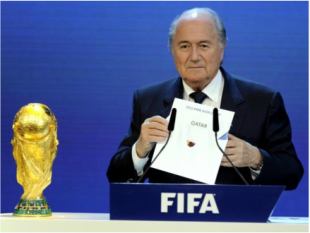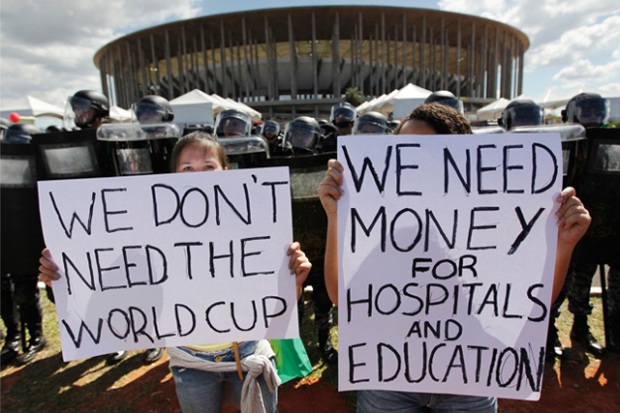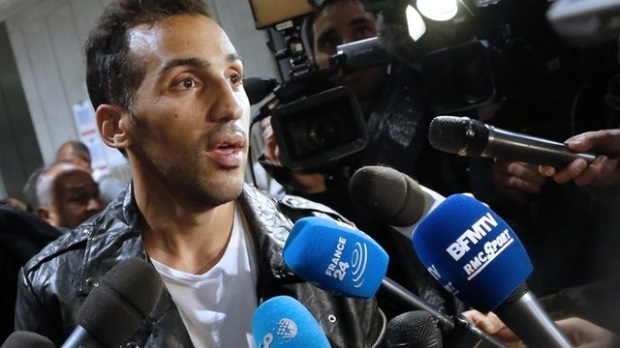
Philippe Desmazes: AFP Photo
In 2010, Sepp Blatter, the president of FIFA, pulled a card out of an envelope with ‘QATAR’ written in bold letters – announcing the small, oil-rich country as the host of the 2022 World Cup. At the time, most people had no idea to the true extent of the controversy that lay in wait. Corruption allegations, logistical impossibilities, human rights abuses…the future of the World Cup was, and remains, uncertain at best.
Brazil 2014 obviously came with its own controversies – it was the ridiculous expense of the World Cup amidst the high poverty rate which led to massive protests on the streets of Brazil. It’s also important to note that FIFA and its corporate partners are exempt from tax in the host country. So aside from the millions of dollars Brazil spent on stadiums, these exemptions amounted to an estimated loss of almost $248.7 million dollars. Of course, many people argue that hosting the World Cup gives an immense boost to a country’s economy in terms of tourists coming in and spending their cash. Still, it is not a trifling amount of money to be lost.

Brazilians protesting before the start of the World Cup. Source: InternetJelly
Qatar comes with its fair share of problems, the least of which are the summer temperatures, which can average above 40°C. At the moment there are two proposed solutions – one of which, championed by Sepp Blatter, is to hold the tournament in the winter, disrupting the major European leagues as well as the Winter Olympics. It is perhaps one of the most ludicrous of all ideas tossed out there, alongside the proposition that Qatar could have air conditioning in all of its stadiums. Another proposal, by a senior FIFA official is to delay official kick-off times, so that matches would finish in the middle of the night. Truly, these are the ingenious ideas of the crème de la crème of football’s governing body.
What is most baffling about this whole ordeal is that surely these facts should have occurred to FIFA before Qatar was selected as the winning bid? It is not as though they have just materialised; these are existing, well-known facts. The summer temperatures in the oil-rich Middle Eastern country are unbearable. Dr. Vincent Gouttebarge explains succinctly the adverse effects of hot conditions on players in an article on FIFPro. Heat exhaustion is a serious problem, and whilst measures such as frequent water breaks have been suggested, the point remains that unless Qatar’s bid had included viable ways to combat logistical problems such as this, it never should have been successful. Air conditioning in all the stadiums is not a viable solution, by the way.
Worse still, however, are the human rights abuses. Out of the roughly two million residents of Qatar, only around 10% are nationals. There is a large and growing migrant population, whose rights are not adequately protected by Qatari law. The ‘kafala’ system – where a migrant worker’s legal residence is tied to their sponsor – is a breeding ground for abuse. Their sponsor becomes their jailer; they’re barred from changing jobs, prohibited from unionising and usually have their passport taken away. Perhaps the most pertinent example of this is the case of Zahir Belounis, a French footballer trapped in Qatar for almost two years due to a dispute with his club.
 Zahir Belounis, speaking to the media. Source: BBC
Zahir Belounis, speaking to the media. Source: BBC
Whilst Qatar is not a party to many international treaties, including the Universal Declaration on Human Rights, there is no question that the current state of the law in the country is in serious breach of fundamental human rights.
Qatar is, however, a signatory to the International Convention on the Protection of the Rights of All Migrant Workers – the primary objective of which is to protect migrant’s human rights. Article 8 provides the right to leave the State, which migrant workers in Qatar don’t have if they need the approval of their employers to exit the country. The right to be free of degrading treatment is contained in Article 10, and the right to not be subjected to forced labour is in Article 11. Some of the living conditions of migrant workers in Qatar are deplorable, there is no question as to the fact that they are degrading.
 Living conditions of migrant workers in Qatar. Source: Al Jazeera
Living conditions of migrant workers in Qatar. Source: Al Jazeera
Those of us who are fans of the beautiful game have to consider the price we’re willing to pay. We have reached a point where the level of corruption has become intolerable, and surely we want to have a better impact on the world than this? Football can be something that unites people, that brings joy to people, it is not something that should cause this much pain and suffering. I know that I don’t want to be associated with a World Cup in a country with such a horrific track record of human rights abuses. It isn’t likely that FIFA would change the venue as this would be admitting defeat – absolutely unacceptable for an organisation that will take any measures necessary to avoid tarnishing its reputation. The proposed solutions may be ludicrous, but incredulously enough are the most viable options, for lack of a better alternative.
It remains to be seen how FIFA will address these issues, if they will at all.